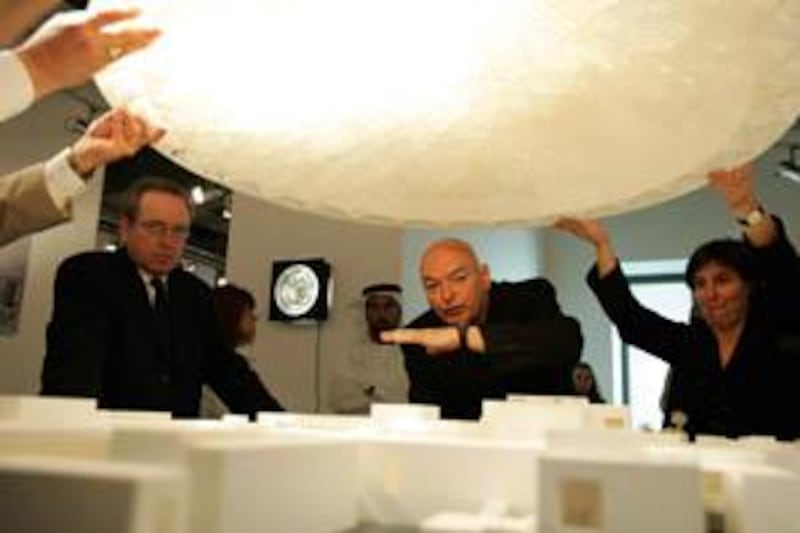ABU DHABI // A new "dialogue of civilisations" began in earnest yesterday with the unveiling of the first masterpieces that will eventually take their place at the heart of the Louvre Abu Dhabi's collection. Works by Paul Cézanne, Edouard Manet and Piet Mondrian were among the 29 pieces that went on show at the Emirates Palace hotel as an early taste of what art lovers can expect from the museum on Saadiyat Island when it opens in 2013.
The French president, Nicolas Sarkozy, and Sheikh Mohammed bin Zayed, the Crown Prince of Abu Dhabi and Deputy Supreme Commander of the UAE Armed Forces, yesterday viewed the works, many of which were said by the curators to be of international significance. They will remain on display until July 2. Sheikh Khalifa, President of the UAE, said in a statement that the Louvre Abu Dhabi would open up the capital to the rest of the world. "Abu Dhabi's ultimate goal in creating the Louvre Abu Dhabi, and indeed the entire Saadiyat Island Cultural District, is to build a platform for deeper and more meaningful exchange among people from our own region and from all parts of the globe."
He called the accord struck with the French government in March 2007 to locate a Louvre here an "unprecedented cultural partnership". Mr Sarkozy and Sheikh Mohammed were presented with a time capsule filled by French and Emirati pupils. It will be buried at the Louvre site and reopened in 50 years. The French leader heralded the agreement with the UAE, which will see artworks lent from French museums to Abu Dhabi and allows the Louvre name to be used by the capital's museum for an initial 30 years.
"Together, we have embarked on an extraordinary journey of cultural exchange and collaboration," he said. "I believe that our two countries will forever be strengthened by this partnership." Sheikh Mohammed said: "At every step of this remarkable and innovative collaboration, the ties of friendship and respect between Abu Dhabi and France grow stronger." Among the artworks on show at the Emirates Palace hotel are the 1922 painting Composition with Blue, Red, Yellow and Black by the Dutch artist Piet Mondrian, which was bought from the personal collection of the late designer Yves Saint Laurent.
A number of other pieces were also acquired from an auction of Saint Laurent's collection that was held in Paris in February, notably two decorative basins. Other highlights are three works by the French artist Edouard Manet, which have been permanently acquired for the new museum, and a 1904 painting by Paul Cézanne, on loan from the Musée d'Orsay in Paris. Initial work on the Louvre site started in January, under the supervision of Tourism Development and Investment Company (TDIC), although formal groundbreaking has yet to take place.
When open, the 24,000 square metre museum will sit alongside a branch of the Guggenheim museum, the Sheikh Zayed National Museum and a Maritime Museum on Saadiyat Island. The TDIC said yesterday that the new Louvre would "create a dialogue of civilisations". Designed by the French architect Jean Nouvel, who accompanied Mr Sarkozy and Sheikh Mohammed on yesterday's visit, the museum will be covered in a distinctive pierced shell that will allow daylight to filter through.
Henri Loyrette, director of the Louvre in Paris, said it would not be a simple replication of the French museum in another country. "The Louvre Abu Dhabi project is unique, in that it does not attempt to duplicate the Louvre but to create an entirely new museum." He said the exhibition at the Emirates Palace was proof that the process of selecting works of the highest quality "is already being realised - and with what elegance."
@Email:rhughes@thenational.ae






